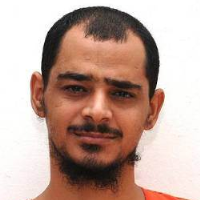Cleared for Release, but Still at Guantánamo, Prisoner Committed Suicide
 Adnan Farhan Abdul Latif
Adnan Farhan Abdul Latif
“We are in the power of no calamity,” wrote physician Sir Thomas Browne, “while death is in our own” power, a sentiment acted upon by former Guantánamo prisoner Adnan Farhan Abdul Latif when he took his own life last year. When one’s situation is utterly hopeless, suicide can be a rational choice, as the ongoing hunger strike by more than half of the detainees at the U.S. prison at Guantánamo Bay, Cuba, has been demonstrating since February.
According to a military report made public on Friday, Yemeni detainee Latif killed himself by swallowing 24 capsules of a psychiatric medication called Invega, which is used to treat schizophrenia. The report does not explain how Latif, who was subject to frequent searches, managed to obtain and hide so many pills without guards finding out.
Born on December 27, 1975, in Aluday, Yemen, Latif suffered severe head injuries at the age of 19 in a car accident that fractured his skull, permanently damaged his hearing and left him with chronic neurological problems. He also had several cognitive and psychiatric problems, including bipolar disorder and “borderline personality disorder,” for which he took many medications at Guantánamo.
A poor man living in an underdeveloped country, Latif traveled from Yemen to Jordan to Pakistan in 2001 to seek free medical treatment, but U.S. officials alleged the purpose of his travels was to get military training from affiliates of al Qaeda.
Captured in December 2001 near the Pakistan-Afghanistan border during a broad dragnet of Arabs by bounty hunters who proclaimed him a terrorist and turned him over to the U.S. military in Afghanistan, Latif was taken to Guantánamo prison in January 2002. Within three years the Department of Defense concluded Latif was not a threat and should be released, and re-affirmed that decision in 2006 and 2008. In 2009 a special task force also ruled that Latif should be released, a decision it could reach only with the unanimous consent of the U.S. intelligence community.
Latif’s attorneys responded by filing a habeas corpus petition seeking his immediate release.
After 8½ years of abusive treatment inside Gitmo and legal skirmishing outside it, federal judge Henry Kennedy granted the habeas corpus petition and ordered Latif’s release, ruling that the government had failed to show by a preponderance of evidence that he was part of al Qaeda or any affiliate. Latif’s victory was short-lived, however, as the DC Circuit Court of Appeals reversed the ruling on October 14, 2011, and the Supreme Court decided not to review the case.
Both the George W. Bush and Obama administrations were reluctant to free Latif and others from Yemen, citing the country’s poor security conditions in case they were imprisoned again upon arrival in Yemen. Others have suggested that some of the Yemenis cleared for release, although they may not have been terrorists when they entered Guantánamo, may have been turned into potential terrorists by their years I American custody.
Less than one year after the decision by the appeals court, on September 8, 2012, Latif died.
In his final years at Guantánamo, Latif participated in hunger strikes and was confined in the “disciplinary” wing of the prison for throwing bodily fluids on guards. Suffering from depression, he made several suicide attempts, including slashing his wrists in 2009, later writing that his circumstances at Guantánamo “make death more desirable than living.”
David Remes, a lawyer for Latif, has complained that investigators apparently did not interview detainee witnesses and has suggested that a guard may have slipped Latif the drugs to assist in his suicide. Adding fuel to the fire is the fact that Latif was transferred to a different cell the day before he died, raising questions about how he could have concealed so much contraband medication.
The report, however, concludes that Latif hoarded the medication on his own and took advantage of a series of oversights and lapses in procedures.
On December 26, 2010, Latif wrote to his attorney that he was “happy to express from this darkness and draw a true picture of the condition in which I exist. I am moving towards a dark cave and a dark life in the shadow of a dark prison. This is a prison that does not know humanity, and does not know anything except the language of power, oppression and humiliation for whoever enters it. It does not differentiate between a criminal and the innocent.”
-Matt Bewig
To Learn More:
Suicide by Pills Is Cited in Death of Guantánamo Detainee (by Charlie Savage, New York Times)
Report on Latif’s Suicide while in Custody (U.S. Southern Command) (pdf)
Prisoner Dies at Guantánamo 8 Years after he was Recommended for Release (by Noel Brinkerhoff, AllGov)
- Top Stories
- Unusual News
- Where is the Money Going?
- Controversies
- U.S. and the World
- Appointments and Resignations
- Latest News
- Trump to Stop Deportations If…
- Trump Denounces World Series
- What If China Invaded the United States?
- Donald Trump Has a Mental Health Problem and It Has a Name
- Trump Goes on Renaming Frenzy






Comments